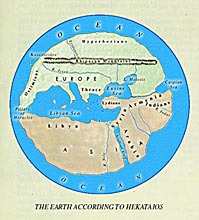

The first logographoi made their debut in the
Works by the logographoi can be divided into two genres. The first is the circumnavigation, where the course of some voyage made by the writer is described, with references to 1) practical experience (distance from one port to another; river estuaries; hazards; freshwater stations and so on), and 2) to the manners and customs of the peoples met with. One representative of this genre whom we know of is Scylax from Caryanda. He described a voyage made towards the end of the
A second genre was the horoi, which were town chronicles. For the period before Herodotus we know of no writer in this genre. Charon from Lampsacus, who lived in the post-Persian war period, as well as writing two books (his Persica) on Persian history, also wrote another four with the title 'Horoi of the people of Lampsacus'. Some scholars believe that these were based on annals of older date. The most important of all the logographoi and precursors of Herodotus [-os] was |
 |
 |
 |
|
| |
|||
| |||